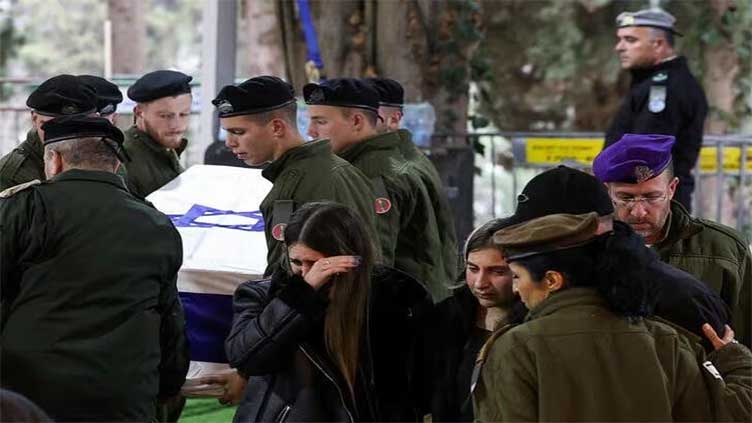Gaza: Israel loses 24 soldiers in worst single-day loss

World
Military said 21 soldiers were killed when two buildings they had mined for demolition exploded
GAZA/JERUSALEM (Reuters) – Twenty-four Israeli soldiers were killed in Israel's worst day of losses in Gaza, the military said on Tuesday while also claiming to have encircled southern Gaza's main city and killed dozens of Palestinian fighters in a major ground assault of the new year.
Spokesman Rear Admiral Daniel Hagari said 21 soldiers were killed when two buildings they had mined for demolition exploded after militants fired at a nearby tank. Earlier, three soldiers were reported killed in a separate attack in southern Gaza.
"Yesterday we experienced one of our most difficult days since the war erupted," Israeli Prime Minister Benjamin Netanyahu said. "In the name of our heroes, for the sake of our lives, we will not stop fighting until absolute victory."
The deaths came as the Israeli Defence Forces (IDF) attacked the western part of Khan Younis, the main city in the south of the enclave which is sheltering hundreds of thousands of Palestinians who have fled areas to the north. Israel says the city is now the principal base of Hamas, the Islamist group that rules Gaza.
"Over the past day, IDF troops carried out an extensive operation during which they encircled Khan Younis and deepened the operation in the area. The area is a significant stronghold of Hamas’ Khan Younis Brigade," the military said.
"Ground troops engaged in close-quarters combat, directed (air) strikes, and used intelligence to coordinate fire, resulting in the elimination of dozens of terrorists."
Gazans say the advancing Israeli forces have since Monday blockaded and stormed hospitals in the crowded city, leaving the wounded and dead beyond the reach of rescuers.
Bodies were being buried in the grounds of Khan Younis's main Nasser hospital because it was unsafe to leave to reach the cemetery. Another Khan Younis hospital, Al-Khair, was stormed by Israeli troops who arrested staff there, and a third, Al-Amal, run by the Palestinian Red Crescent, was unreachable, according to Palestinian officials.
The Red Crescent said a tank shell had hit its headquarters on the hospital's fourth floor, and Israeli forces were firing from drones on anyone who moved nearby, making it impossible to dispatch ambulances for the entire Khan Younis area.
Israel says Hamas fighters operate in and around hospitals, making them legitimate targets. Hospital staff and Hamas deny this.
'GRAVEYARD FOR THE OCCUPATION'
As news of the Israeli losses spread through Gaza, Palestinians celebrated what they viewed as a victory.
"The resistance said it is going to make Gaza a graveyard for the occupation, and this is what is happening,” said Abu Khaled, sheltering in a school in Deir al-Balah, one of the few areas yet to be stormed by Israeli forces, between Khan Younis and the central zone where the Israeli troops were killed.
"The more they stay, the more we will suffer for sure, but the more they will suffer too."
Israel has vowed to wipe out Hamas, which is sworn to Israel's destruction and sent fighters through Israel's border fence on Oct. 7, killing 1,200 people and abducting around 250 hostages, of whom about half remain in Gaza.
At least 25,295 Gazans have since been confirmed killed, according to Palestinian authorities, with thousands more dead feared lost in the rubble of a coastal strip largely laid to waste.
Nearly all of Gaza's 2.3 million people have lost their homes, the vast majority now penned into small towns just north and south of Khan Younis, many sleeping rough in makeshift tents, with food and medicine running out and no clean water.
Israel itself is beginning to see the first stirrings of discontent with Netanyahu's war strategy - committed to the total annihilation of Hamas but with only vague discussion of what should come next for Gaza.
Since last week, Netanyahu has publicly vowed never to let Palestinians have an independent state, a break with Israel's main ally Washington, which has made a peace process ultimately leading to a Palestinian state the bedrock of its Middle East policy for decades.
Relatives of hostages still held in Gaza have called for more effort to bring them home, even if that means reining in the military campaign. A group of them burst into a parliamentary committee hearing on Monday.
Last week, a member of Netanyahu's war cabinet, former military chief-of-staff Gadi Eisenkot, whose own soldier son was killed in Gaza last month, said the campaign had yet to achieve its aim of dismantling Hamas and that there was no hope of freeing the hostages in a military operation. He called for elections to replace a government that he said had lost public confidence.
The conflict has been accompanied by an escalation in violence elsewhere in the Middle East, especially where armed groups allied to Israel's arch foe Iran operate, including Lebanon, Iraq, Syria and Yemen.
The Iran-aligned Houthi movement, which controls most of the populated parts of Yemen, has attacked shipping in the Red Sea in what it says is support for Gaza. The United States and Britain, which have been attacking the Houthis this month, carried out another round of air strikes overnight.


